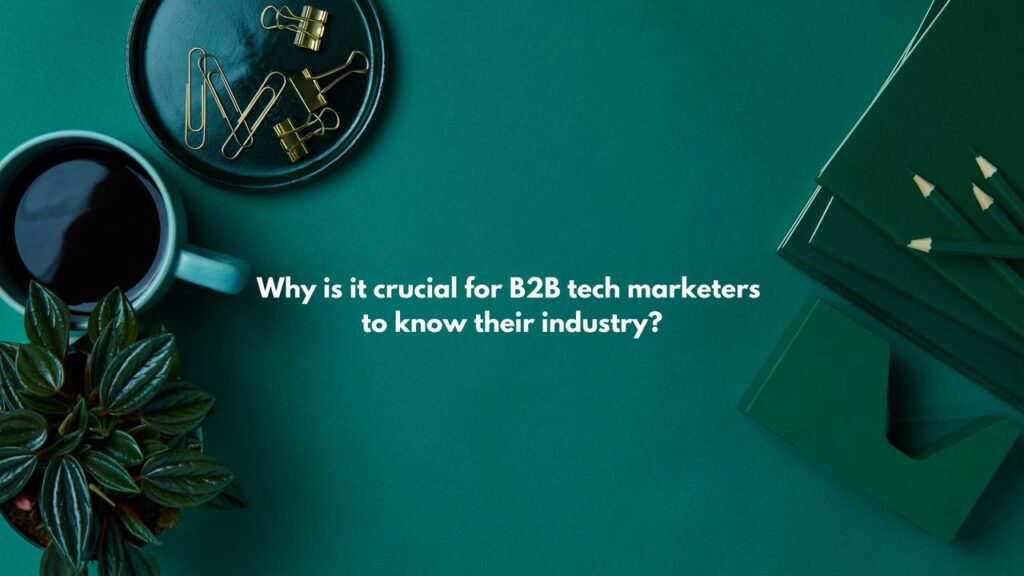Would you rather listen to this post? You can do so on BuzzSprout
If you work in the tech industry, chances are you’ve been exposed to a ton of buzzwords. While we might get them right now and then, sometimes those words start to become meaningless. Buzzwords can also be a way to talk about your business in ways that make it seem more high-tech than it is. An experienced B2B technology marketer can avoid mistakes a junior marketer might make – that could cost your business millions.
1) Vision
The first question you should be asking is, “What do I want my company to look like in five years?” Any marketer who doesn’t ask you right off the bat where you want to take your business isn’t experienced enough. Your 5-year plan will inform your marketing strategy and help you steer away from potential disasters. Knowing what you want your business to stand for and where you are headed makes marketing more manageable as well.
A solid B2B technology marketer will take your vision and paint it into a vibrant story. They will sit their vision underneath yours to take it to another level, and with their help, you should smash your goals. Assuming they are reasonable.
2) Industry Trends
Marketing in any industry today has become more competitive, but in technology, it’s downright cutthroat. As marketing tools and techniques are becoming more ubiquitous, technology firms are being put on an even playing field. Marketers must do everything possible to gain an edge, including researching in-depth about their business environment. Understanding your own industry’s landscape can give you insight into how your competitors are succeeding and what trends they’re trying to capitalize on. Beyond that, since industry trends change quickly, a base understanding of the market helps guide strategy and identify temporary trends versus permanent industry standards. A marketer who knows and understands your industry will get more clicks and have an easier time finding influencers. If you are an expert in IT security, reaching out to people who write about IT security would be easier than reaching out to someone with expertise in e-commerce or catering.
3) Understanding the buyer
Targets of B2B technology marketing campaigns can be challenging because they come from different backgrounds and experiences that need understanding. Understanding these differences before marketing can affect how well-qualified leads become opportunities for sales teams or convert to customers. The difference between qualified lead and opportunity is primarily affected by understanding what separates them as targets – knowing what makes them tick, what kind of content they read, which technologies they’re interested in (if any), etc. This means knowing what knowledge gaps exist to bridge. Marketing to someone based on incomplete information is never going to work, and marketing is based on understanding their perspective. A marketer who knows and understands your industry will get more clicks and have an easier time finding influencers. If you are an expert in IT security, reaching out to people who write about IT security would be easier than reaching out to someone with expertise in e-commerce or catering.
Tech DMs make decisions based on far more than “is the product good.” You have to be able to map the features of your product to a personal benefit. Human beings are motivated by what impacts them personally. So, will your product or service help them keep their family fed by retaining their job? Will they get a raise? Could what you offer help them get the recognition they deserve at work? What are their frustrations? Whom do they care about? How do they spend their free time? A good B2B technology marketer knows the answers, or at the very least, they will do the work to find out.
4) Rapid changes
Many industries have gone through rapid changes. In many cases, such as those in technology and advertising, such changes occur exponentially. For example, there are just ten companies that now control about 90% of all searches on Google: Google, Facebook, Microsoft, Amazon, Yahoo!, YouTube (owned by Google), Apple’s App Store (from which you download software), Apple’s iTunes store (music and video), Instagram (Facebook-owned), Twitter and Snapchat. Ten years ago, the digital landscape was very different. Twenty years ago, it barely existed. Thirty years ago, it was… AOL dialup? Does anyone know what happened to AskJeeves? My point is that the market leader today can be dinosaurs tomorrow, and innovations are coming behind us faster than we might think. You have to be prepared to change strategies to keep up with the competition.
Are you looking for a B2B tech marketer worth their weight in gold? You’ve come to the right place. With 12+ years of business development, marketing, and sales experience focused on B2B technology sales, Megan Killion has influenced over 500 million in pipeline. Book your consult today!

